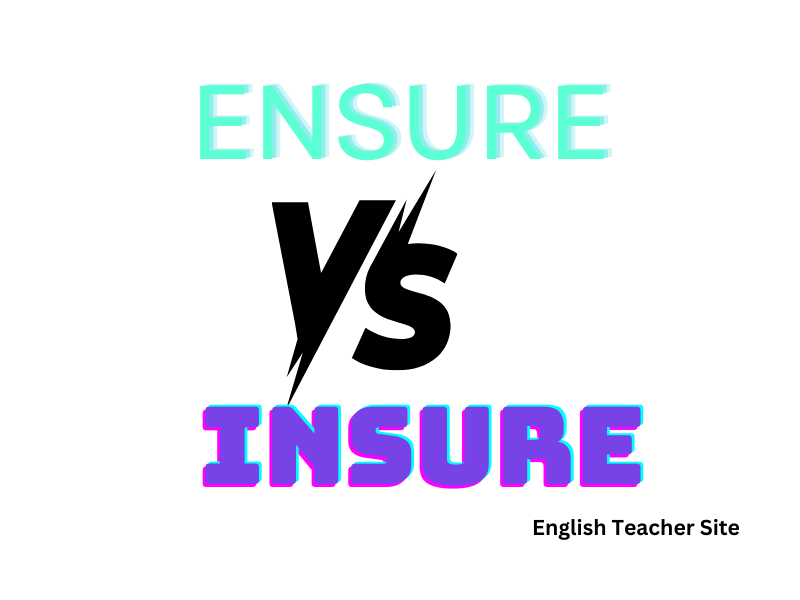Ensure, Insure, and Assure: Understanding the Differences

- “Insure” is typically used in the context of providing financial protection through an insurance policy.
- “Ensure” indicates a guarantee that specific conditions will be satisfied or results will be achieved.
- “Assure” is concerned with the removal of doubts and is often a personal declaration meant to comfort or convince.
Understanding the precise definition of “insure” is key to utilizing it appropriately. Generally associated with financial protection, “insure” refers to the action of securing an insurance policy that provides compensation in the event of loss, damage, or hardship. “Ensure”, in contrast, signifies a guarantee that certain conditions will be met or that particular outcomes will occur. Meanwhile, “assure” relates to the act of removing doubts or worries, frequently involving personal assurances or assertions intended to comfort or convince others.
Exploring the Distinctions: Ensure, Assure, and Insure
Despite their similar appearances, “ensure,” “assure,” and “insure” serve distinct functions within the English language.
Differentiating the Usage of Ensure, Assure, and Insure
Ensure and assure might seem interchangeable but they carry different connotations and usages within sentences. Ensure relates to guaranteeing an event or condition. Assure leans towards offering peace of mind or confidence to a person.
Ensure:
- To guarantee conditions for an event or action to take place.
- Example: Companies implement safety protocols to ensure a secure working environment.
Assure:
- To comfort or convince someone, often related to dispelling doubt.
- Example: A parent might assure their child that they will be safe during a storm.
Insure, however, is more specialized and involves a formal arrangement, often with a financial component, to safeguard against unforeseen loss or damage.
- Insure:
- To secure financial protection or reimbursement against loss or damage, typically through an insurance policy.
- Example: Homeowners insure their property to safeguard against disasters.
| Verb | Definition | Example Sentence |
|---|---|---|
| Ensure | To make certain; guarantee. | Safety measures are implemented to ensure compliance. |
| Assure | To remove doubts; offer confidence to someone. | The guide assured the tourists of their safety. |
| Insure | To protect against loss; provide insurance. | Travelers frequently insure their trips against delays. |
Interchangeability of Ensure, Assure, and Insure
Although “ensure,” “assure,” and “insure” have distinct definitions, in some contexts they have been used interchangeably.
| Acceptable Interchangeability | Unacceptable Interchangeability |
|---|---|
| Assure a friend of your arrival (less formal acceptance) | Insure your arrival (incorrect context) |
| Ensure the safety of a product (common usage) | Assure the safety of a product (less precise) |
- Assure can sometimes be used in place of ensure, but the reverse is often considered incorrect.
- Insure should not be used in place of ensure or assure as it pertains specifically to financial protection.
Bullet points on when not to interchange:
- Do not use insure when discussing non-financial guarantees.
- Avoid using ensure in the context of giving personal reassurances.
- Refrain from substituting assure in regulations or formal contexts where guaranteeing certainty is required.
Unpacking the Meaning of Insure
Insuring something refers to the action of protecting it against potential future losses, often by means of a formal policy agreement with an insurance company. The focus here is on risk management and safeguarding oneself or an asset against unforeseen eventualities.
Key Aspects of Insure:
| Aspect | Description |
|---|---|
| Protection | Insuring provides a safety net against financial loss. |
| Policy | A formal arrangement with an insurer is usually necessary. |
| Risk | Insure implies managing the potential negative outcomes. |
When one insures a car, house, or health, they are essentially entering into an agreement with an insurance provider. This contract assures that the insurer will compensate the insured in the case of specific losses or damages described within the policy agreement.
Distinguishing Insure from Similar Terms:
- Ensure indicates certainty or guaranteeing an outcome.
- Assure involves removing doubts from a person’s mind.
Understanding these differences is essential, considering that despite their shared Latin root, “sēcūrus” meaning “safe”, each term serves a unique function in the language. For example:
- Assurance is often associated with psychological comfort.
- Ensurance relates to making certain that an event or action occurs.
In legal and financial contexts, using insure accurately can be particularly important, with significant implications for the involved parties. The precise use of the term assures the correct understanding of financial responsibilities and obligations. It is important to consult with an insurance professional to fully grasp the extent and boundaries of a particular insurance policy.
Unpacking the Meaning of Ensure
Ensure is a verb commonly used in the English language to describe the action of making certain that something will occur or be the case. The term comes from the Latin word securus, meaning safe, indicating its roots in certainty and security. The core focus of ensure is to guarantee an outcome or condition is likely to happen or to be achieved.
Usage of Ensure
- To pledge or guarantee the occurrence of an event or condition.
- Employed when discussing steps taken to achieve certainty.
Examples in Sentences
- They took steps to ensure the project’s success.
- New policies were implemented to ensure safety in schools.
| Context | Sentence |
|---|---|
| Obligation | The contractor must ensure the building meets the codes. |
| Precaution | Ensure you check the instructions before assembly. |
When using ensure, it’s important to remember that it overlaps with the words assure and insure, yet each holds distinct meanings used for specific cases. Ensure often relates more to creating a situation where the chances of something happening are as high as possible, rather than reassuring people or involving insurance policies.
In summary, the word ensure is pivotal for expressing the securing of outcomes and instilling confidence that certain conditions will be met. As language continues to evolve, the precise application of such terms remains significant for effective communication.
Unpacking the Meaning of Assure
The verb assure has its etymological roots in the Latin word sēcūrus, meaning “safe,” and conveys a sense of confidence or promise. It is distinct from its cousins ensure and insure, though they can sometimes share similar implications.
| Context | Usage Example |
|---|---|
| Personal Promise | “I assure you, your secrets are safe.” |
| Confidence | “She can assure a calm response during crises.” |
When one assures someone, they are making a personal guarantee, often aimed at alleviating doubts or worry. It is tied to the idea of removing insecurities or concerns through a statement of certainty.
- Assurance typically involves a spoken component, such as:
- “He assured her of his commitment.”
- “They were assured that the plan would succeed.”
It is important to note that assure is primarily about giving confidence to others, whether emotional or factual. Its use is generally interpersonal, involving communication between people.
In essence, to assure someone is to provide them with comfort or confidence regarding a particular matter. It may not guarantee an outcome, but it intends to ease the mind of the listener or recipient of the assurance.
| Assurance Aspect | Characteristics |
|---|---|
| Emotional Support | Conveys empathy and understanding. |
| Certainty | Offers a promise or guarantee of support or truth. |
Assuring does not involve the formalities of a contract or financial product, which distinguishes it from insuring, nor does it guarantee an outcome as ensuring does. Instead, it dwells within the realm of personal guarantees and the trust one places in another’s word.
Examples of Sentences Using Insure
In this context, the verb “insure” is often confused with “ensure” and “assure.” However, “insure” refers specifically to the act of providing or obtaining insurance—financial protection against loss, damage, or liability. Let’s look at some examples to clarify its usage.
Common Uses:
| Sentence | Explanation |
|---|---|
| Many homeowners insure their property against natural disasters. | This highlights the action of obtaining an insurance policy for financial protection. |
| It’s wise to insure your car before taking it out on the road. | This implies the legal and practical necessity of having car insurance. |
Insurance-related Terms:
- Policyholder: The person who owns the insurance policy.
- Premium: The amount paid periodically to the insurer.
Examples in Context:
- When travelling abroad, they had to insure their valuables against theft.
- Business owners frequently insure their inventory to mitigate financial risks.
Verb Tenses:
- Simple Present: “They insure their boats at the start of each summer.”
- Simple Past: “She insured her artwork before the exhibition.”
- Present Continuous: “They are currently insuring their new home.”
- Future: “He will insure his phone as soon as he purchases it.”
Examples of Sentences Using Ensure
In the English language, the verb ensure means to make certain that something will happen. It is often used to express the action of guaranteeing an outcome or making sure that a condition is fulfilled.
Affirmative Sentences
- To ensure that the package arrives safely, they used extra padding and a sturdy box.
- She studied diligently to ensure a high score on the examination.
- The company will update its safety protocols to ensure compliance with new regulations.
Note: In these sentences, ensure is used to convey actions taken to guarantee a particular result.
Negative Sentences
| Subject | Cannot Ensure |
|---|---|
| The teacher | cannot ensure every student will complete their homework. |
| We | cannot ensure the success of the project without funding. |
| The gardener | cannot ensure the plants will survive an unexpected frost. |
Note: Here, ensure is negated to express the limitation of guaranteeing a certain outcome.
Questions
- How can she ensure the prompt delivery of her message?
- What measures can we take to ensure the safety of our data?
- Can the school ensure a balanced curriculum for all students?
bullet points for additional emphasis:
- How can employers ensure fair recruitment practices?
- What steps must one take to ensure a balanced diet?
- Can manufacturers ensure product quality despite cost-cutting measures?
Note: Question sentences with ensure inquire about the methods or possibilities of securing a desired result.
Correct usage of ensure helps convey a sense of certainty and commitment to an outcome. By mastering such verbs, speakers can articulate their intentions with precision and confidence.
Examples of Sentences Using Assure
“Assure” is one such word. It means to remove doubt or to make someone confident in a belief or outcome. Let’s examine several examples of how to use “assure” in sentences.
Positive Assurance:
- She assured her parents she was well-prepared for the exam.
- The coach assured his team that they had the potential to win.
Reassurance in Uncertain Situations:
- He assured her that despite the setbacks, the project would be completed on time.
- The doctor assured the patient that the surgery had been successful.
| When Offering Comfort | When Making a Promise |
|---|---|
| He assured her of his support during difficult times. | They assured us of prompt service. |
| She assured the child that there was nothing to fear from the dark. | The airline assured passengers of their safety despite turbulent weather. |
Using “Assure” in Formal Contexts:
- In the agreement, the company assured investors of a commitment to sustainability efforts.
- The government official took the podium to assure the public that the water supply was safe.
Bolding Words for Emphasis and Clarity:
- He assured the team of his unwavering dedication to the project’s success.
- Their manager boldly assured stakeholders of the company’s stable financial future.
Synonyms for Insure
When discussing “insure,” it’s crucial to acknowledge words with similar connotations that can be interchanged in certain contexts. Insure, primarily associated with the financial and risk management sectors, shares common ground with a number of other terms. Below, the synonyms are presented in a manner conducive to clarity and comprehension for those exploring this financial verb’s equivalents.
Synonyms in the Context of Risk Management
| Synonym | Usage |
|---|---|
| Secure | He chose to secure his business by investing in a comprehensive insurance plan. |
| Guarantee | They offer a warranty to guarantee the item against defects. |
| Safeguard | Installing an alarm system can safeguard a home against theft. |
Each term listed can be employed when discussing measures to protect against potential future loss or harm.
Synonyms in the Context of Acquiring Insurance Coverage
| Synonym | Usage |
|---|---|
| Cover | The new policy will cover damages caused by natural disasters. |
| Underwrite | Insurance companies underwrite policies to provide financial support in the event of specified losses. |
| Protect | To protect against unforeseen medical expenses, they decided to purchase health insurance. |
These alternatives focus on the act of obtaining insurance or providing a promise of compensation in the case of particular adverse events.
Bullet points offer another means to showcase these synonyms:
- Assure – often conveys a sense of removing doubt or making a promise certain.
- Ensure – implies taking action to guarantee that something will happen or function as intended.
Synonyms for Ensure
In English language usage, the verb ensure conveys the action of making certain that something will occur or be the case. It’s a term that’s frequently used in contexts where one seeks to guarantee an outcome. Here’s a concise exploration of its synonyms:
Table 1: Direct Synonyms
These terms are often used interchangeably with ensure in various contexts:
| Synonym | Usage Context |
|---|---|
| Guarantee | Used to express a strong promise that something will happen. |
| Secure | Refers to making an event or condition safe and certain. |
Table 2: Contextual Synonyms
While these words can be akin to ensure, their usage is dependent on context:
| Synonym | Usage Context |
|---|---|
| Certify | Used when providing official confirmation or assurance. |
| Safeguard | Implies protecting something from harm, ensuring its safety. |
In written and spoken English, guarantee and secure are frequently found as direct replacements. To guarantee a result often implies a more authoritative promise when compared to ensure. On the other hand, to secure suggests taking necessary measures to bring about certainty.
When the intention is to provide validation, certify is often utilized. Conversely, safeguard emphasizes a protective aspect, ensuring that an entity is kept safe from potential threats.
In addition to these, there are more verbs that share the attribute of creating certainty:
- Affirm
- Verify
- Confirm
Each synonym has its nuanced use, enabling precise expression in diverse situations. The choice among these words enables the speaker or writer to convey the exact degree of certainty and the nature of commitment involved in ensuring an outcome.
Synonyms for Assure
Positive Connotations:
When one wants to convey a positive guarantee, often related to emotional support or uplifting reassurance, the following synonyms might be chosen:
- Reassure
- Comfort
- Console
| Word | Use Case in Sentence |
|---|---|
| Reassure | “The teacher reassured the students of their potential.” |
| Comfort | “After the loss, she comforted her friend with kind words.” |
| Console | “He consoled the grieving family with a heartfelt message.” |
Guarantee of Outcome:
To indicate a stronger, more formal guarantee related to events or results, the language shifts slightly:
- Guarantee
- Certify
- Confirm
| Word | Use Case in Sentence |
|---|---|
| Guarantee | “The new policy guarantees customer satisfaction.” |
| Certify | “The document was certified by the authorities for authenticity.” |
| Confirm | “The spokesperson confirmed the success of the product launch.” |
Tracing the Origin of Insure
The term “insure” has a rich etymological path that starts with its Latin roots. Originally stemming from the Latin word sēcūrus, meaning “safe, secure, or free from care,” it encapsulated a sense of protection and certainty. The evolution of “insure” through Old French and into Middle English involved changes in form and spelling.
Significant Milestones of Etymology:
| Language | Term | Meaning |
|---|---|---|
| Latin | Sēcūrus | Safe, secure |
| Old French | Asseurer | To assure or secure |
In the late 14th century, the English usage of “insure” began taking shape, closely mirroring the context of its French precursors. It eventually gravitated toward the financial and legal contexts we are familiar with today.
Evolution into Modern Usage:
- 14th Century: The term was associated with the notion of making something sure or certain.
- 16th Century: It began to be specifically tied to contracts that provided a form of compensation for loss.
- 17th Century Onwards: The word was solidified in the domain of financial contracts and legal terms, referring to formalized protective measures against loss or damage.
The transition from a general assurance to a financial guarantee highlights the specialized nature of “insure” as it is understood in contemporary contexts.
- Contemporary Definition: To contract for financial compensation against potential future loss, damage, or liability.
Tracing the Origin of Ensure
The word ensure has a compelling linguistic history. Derived from Old French, the term ‘ensurer’ originally meant “to make safe,” a promise of certainty. Over time, it morphed, influenced by Middle English connotations of security and protection.
The evolution of ensure is documented through the following key stages:
- Old French Period: The root of “ensurer” conveys a sense of making something sure.
- Middle English Influence: The term absorbs additional implications of guarantee and security.
Latin Roots:
Looking further back, ensure traces its lineage to Latin. The word ‘securus’—meaning ‘secure’—is central to its ancestry. This Latin term underpins many modern words related to safety and certainty.
| Century | Development |
|---|---|
| 13th Century | Emergence in Old French |
| 15th Century | Adoption into Middle English |
| Modern Day | Current usage in English |
Cognates and Cousins:
As ensure entered the English language, it developed alongside close relatives: assure and insure. These verbs share origins but have since diverged in meaning and application.
- Ensure: To guarantee, make certain.
- Insure: To protect financially.
- Assure: To tell someone something positively or confidently to dispel any doubts they might have.
Usage Variations:
Over time, ensure has maintained a niche usage focusing on guaranteeing outcomes or events. It is often employed in formal and practical contexts, such as legal documents and policy-making discourses.
| Context | Example Usage |
|---|---|
| Legal | Ensuring compliance |
| Policy-Making | Ensuring outcomes |
In summary, ensure carries centuries of historical baggage, signifying a guarantee of safety or occurrence. This term has survived linguistic shifts, maintaining its role in providing surety within the English language.
Tracing the Origin of Assure
The etymology of assure traces back to the Latin root sēcūrus, meaning “secure.” Over time, the word evolved through Old French before arriving in Middle English. Initially, the term asseurer carried the legal notion of assuring or making certain.
Assurance often implied a form of protection or guarantee. The legal connotation has dwindled, but the promise or guarantee aspect remains. Below is its evolution displayed in a simplified table format:
| Latin (Origin) | Old French | Middle English |
|---|---|---|
| sēcūrus | asseurer (v.) | assure |
In English, assure came to signify the act of removing doubt, pledging certainty, or making a commitment to another person. It addresses emotional security rather than physical or financial.
The linguistic journey of assure comprises:
- Latin: The root sēcūrus intersects with safety and security.
- Old French: Transitioned into asseurer, the practice of making a pledge.
- Middle English: Took the form assure, narrowing its scope to removing doubts.
Source
1. Harper, Douglas. “Etymology of insure.” Online Etymology Dictionary, https://www.etymonline.com/word/insure
2. Harper, Douglas. “Etymology of ensure.” Online Etymology Dictionary, https://www.etymonline.com/word/ensure
3. Harper, Douglas. “Etymology of assure.” Online Etymology Dictionary, https://www.etymonline.com/word/assure
My name is Khamis Maiouf. I am the creator of the English Teacher Site, dedicated to providing valuable resources and insights for students around the world. With a passion for education and a commitment to helping students enhance their skills, I aim to make English teaching more effective and enjoyable for both educators and students.






